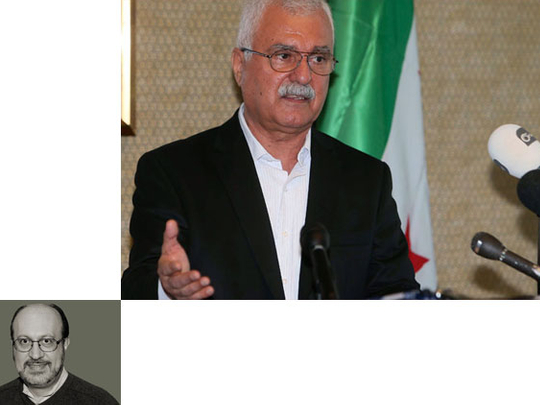
Unlike the Tunisian, Egyptian and even Yemeni opposition forces — all of which managed to successfully appoint or elect unified leaderships that mobilised public opinion and toppled existing dictatorships — Syrian revolutionaries wallowed in utter competition that prevented, at least so far, a felicitous regime change in Damascus.
For nearly two years, interminable Syrian National Council (SNC) meetings, including those supported by foreign powers, failed to unify ranks. From Burhan Galiun to Abdul Basit Sida to George Sabra, the SNC initiated numerous plans, but was almost always caught in a whirlwind of chaos. Without exaggeration, the results of these contending rivalries essentially prolonged the sufferings that Syrians endured, and that further sank the country into its ongoing civil war.
Perhaps to end interminable quarrels, a group of activists backed by the US, France, Saudi Arabia and Qatar finally proposed to create an alternative and more inclusive body, first known as the Syrian National Initiative, and later renamed the National Coalition for Syrian Revolutionary and Opposition Forces (NCSROF).
At long last, it may be accurate to state that the Syrian opposition’s power struggles ended on November 11 when a charismatic leader was finally chosen to salvage what could be rescued from the Syrian Revolution. Muath Al Khatib, a modernising Sunni cleric who wears western clothes and shuns sectarian distinctions, was elected president of NCSROF, seconded by two vice presidents, Suhayr Al Atassi, the daughter of Jamal Al Atassi, a leading Baath Party Member who was sidelined by Hafez Al Assad. A second vice-president was Riad Sayf who, according to Reuters, was “an old comrade [of Al Khatib] who played a key role in devising the new opposition structure”.
Speaking in Doha and flanked by Arif Dalilah, a veteran economist [Alawite] as well as one of Syria’s key thinkers, Michel Kilo [Christian], Al Khatib heard the gathered throngs chant: “One hand! The Syrian people are one!”
Conference attendees reported that just before opposition figures gathered in Qatar to finally rethink how they planned to overthrow the Damascus regime, Al Khatib circulated an open letter to the Syrian people in which he identified what the three key goals of the revolution ought to be: to remove the current “fascist system” from power; encourage the participation of minorities — especially ‘Alawites, Armenians, Kurds and Druzes — in the revolt; and put an end to the horrible and still gushing bloodshed.
Inasmuch as Al Khatib was elected unanimously, and given his well-established credentials — as a critic who spoke against the regime in 2011 in the staunchly Sunni Damascus suburb of Duma that landed him in jail before he escaped to Cairo five months ago — few ought to now question whether the Syrian opposition can win international recognition and support.
This was important because no major powers recognised the authority of the SNC, even if most paid lip service to it. An indication that Al Khatib’s legitimacy came about last Monday when the six-member Gulf Cooperation Council (GCC) recognised the NCSROF as the legitimate representative of the Syrian people. GCC Secretary-General Abdul Latif Al Zayani read a matter-of-fact statement that sealed the deal, which should also be a harbinger for other regional and international powers to adopt similar planks. France followed on Tuesday while other powers contemplated similar recognitions.
Still, two key hurdles faced the NCSROF, both of which required utmost care. First, it was incumbent to rally every revolutionary, especially those fighting under extreme conditions. In fact, the chief reason why the SNC bungled so many opportunities was due to the undeniable fact that those doing the actual fighting, including former members of the Syrian Arab Army, were wary of exiles who pontificated from Paris, Cairo and Istanbul.
A second, and equally critical challenge was that posed by radicalised elements, allegedly linked to the fictitious Sunni Al Qaida movement. Beyond Al Qaida, extremist forces that wished to hijack the Syrian Revolution and create a Salafist state in Damascus could not be discounted, even if one should not exaggerate their intrinsic capabilities.
Al Khatib must now persuade Alawite Syrians that the country’s many ills ought not simply be blamed on them. On the contrary, he must rally all minorities around his legitimacy and persuade Arab and Western leaders to stop fearing that the uprisings would turn into a radical Sunni-led armed revolt.
In his Doha acceptance speech, he affirmed that the NCSROF raised its voice for the “freedom for every human being in [Syria], for every Sunni, for every Alawite and for every Ismaili and Christian from the Arab or from the great Kurdish nation.” These words moved many who, perhaps for the first time, realised that the reinvigorated opposition stood a chance. He even saluted “the women of Syria” in his address, an overdue acknowledgement, thereby recognising the key roles that women played in the Damascus demonstrations.
Those who believed that the Syrian revolution would lead the country to adopting Sharia in what is one of the most secularised Arab nations ever were sure to be disappointed because Damascus was unlikely to be ruled by extremists. Al Khatib, whose father was the Imam of the Umayyid Mosque, carried the tradition of moderation. The scion of a Damascene religious family that played key roles in running the majestic mosque for decades, Al Khatib now inherits a new writ: to unify his wounded nation. How he preaches that unity, both at home as well as overseas, will surely determine whether the Syrian revolution will finally accomplish its stated objectives.
Dr Joseph A. Kechichian is the author of Legal and Political Reforms in Saudi Arabia.








